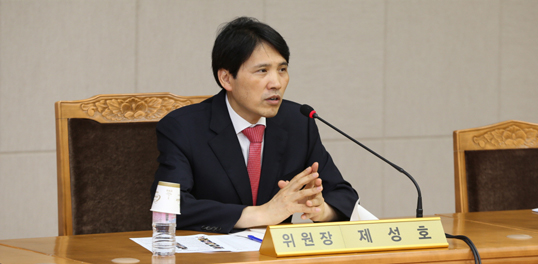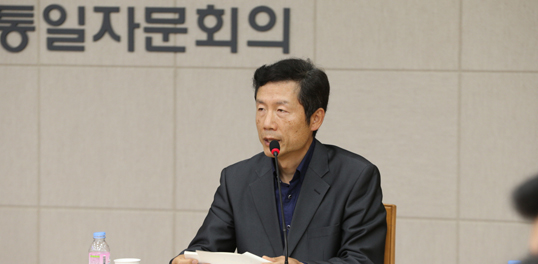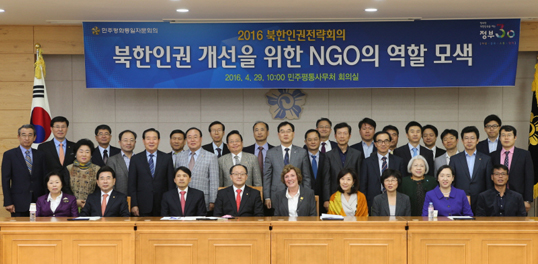NUAC, Human Rights Legislation Standing Committee hold the “Conference on Strategies for the Human Rights of North Koreans”
Seeking allocation of roles and cooperative relations between the government and NGO for the improvement of human rights of North Koreans
The NUAC Human Rights Legislation Standing Committee (Chief: Jhe Seong-ho, professor of Chung-Ang University), in celebration of the “North Korea Freedom Week,” held a conference on the strategies for the human rights of North Koreans on April 29 (Friday), 10:00 a.m. at the conference room of NUAC, with more than 30, including representatives of NGOs related to the human rights of North Koreans and Council Members, attending.

Overview of the Opening Ceremony
With interest in the human rights of North Koreans increasing following the passage of the 「North Korean Human Rights Act」, the conference on this day was held to seek the allocation of roles and cooperative relations between the government and NGO to promote actual improvement of human rights of North Koreans.
At the conference, the respective representatives of 15 related agencies such as Network for North Korean Democracy and Human Rights and Committee for the Democratization of North Korea attended. The conference kicked off with opening remarks by NUAC Human Rights Legislation Standing Committee Chief Jhe Seong-ho, welcome remarks from Executive Vice-chairperson Yoo Ho-yeol, congratulatory remarks from North Korea Freedom Coalition Representative Suzanne Scholte, keynote speech by North Korea Democratization Network Assistant Researcher Kim Yong-hwan, and plenary debate.

Opening Remarks from Chief Jhe Seong-ho
"We are in an international environment that is harsher than ever due to North Korea's abnormal movements. This is the time when we should seriously consider the reunification issue. Since the institutional infrastructure for improving the human rights of North Koreans is now established with the passage of the North Korean Human Rights Act, we should altogether take follow-up measures step by step," Chief Jhe Seong-ho said during his opening speech.

Welcome Remarks from Executive Vice-chairperson Yoo Ho-yeol
During his welcome remarks, Executive Vice-chairperson Yoo Ho-yeol noted that the passage of the North Korean Human Rights Act is the fruit of the long struggle by NGO agencies here today. "As Suzanne Scholte mentioned, although it’s easier said than done, the people and the government should work together to improve the human rights of North Koreans and hasten reunification through the effective inflow of outer information," he added.

Congratulatory Remarks from North Korea Freedom Coalition Representative Suzanne Scholte
Lastly, according to Suzanne Scholte, forming a bond of sympathy on the human rights of North Koreans is an important stage. “Recording all contents of ceremony for North Korea Freedom Week and broadcasting them as propaganda to the North will be done. Let's inform North Korea civilians of our efforts and give them hope by letting them know there is an alternative to Kim Jong-un," she said.
In the main conference that followed, various ideas on the role of NGO and its solidarity and direction of activities for the improvement of human rights of North Koreans were presented. "The issue on the human rights of North Koreans is of neutral value that is neither conservative nor progressive. One should be ready to participate practically in the human rights issue of North Koreans when one wants to raise questions about it. South Korea raising issues on the human rights of North Koreans may seem ineffective; for the sake of peaceful·democratic reunification, however, constantly bringing up issues in various forms is necessary," said Assistant Researcher Kim Yong-hwan in his keynote address.

Keynote Address from Assistant Researcher Kim Yong-hwan
The representatives of the 16 NGOs who attended discussed the following: ▶ allocation of role and mutual cooperation are required so that the activities aimed at improving the human rights of North Koreans do not overlap; ▶ vitalization of propaganda broadcast to North Korea, enhancement of the effectiveness of spreading information within North Korea through activities such as sending USB movement; ▶ vitalization of education to the public and adolescence on the human rights of North Koreans; ▶ demanding the amendment of the North Korean Human Rights Act such as recognizing North Korean defectors as refugees; ▶ development of a human rights strategy that can treat the North Korean regime and civilians separately; and ▶ vitalization of the bond of NUAC Municipal Chapters and NGOs.

Commemorative Photograph
Based on the results of the conference, NUAC is planning to seek constant and regular cooperative relations with NGOs and work jointly on the follow-up measures through allocation of roles and mutual trust.







